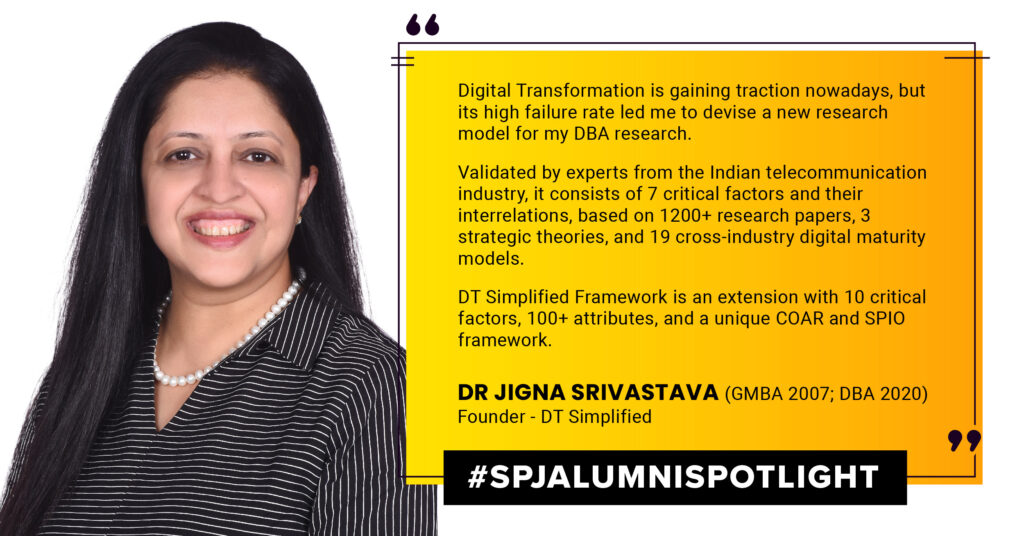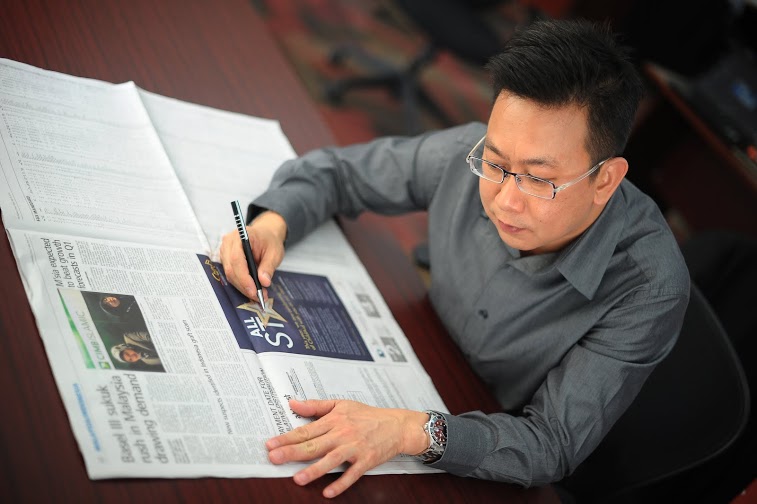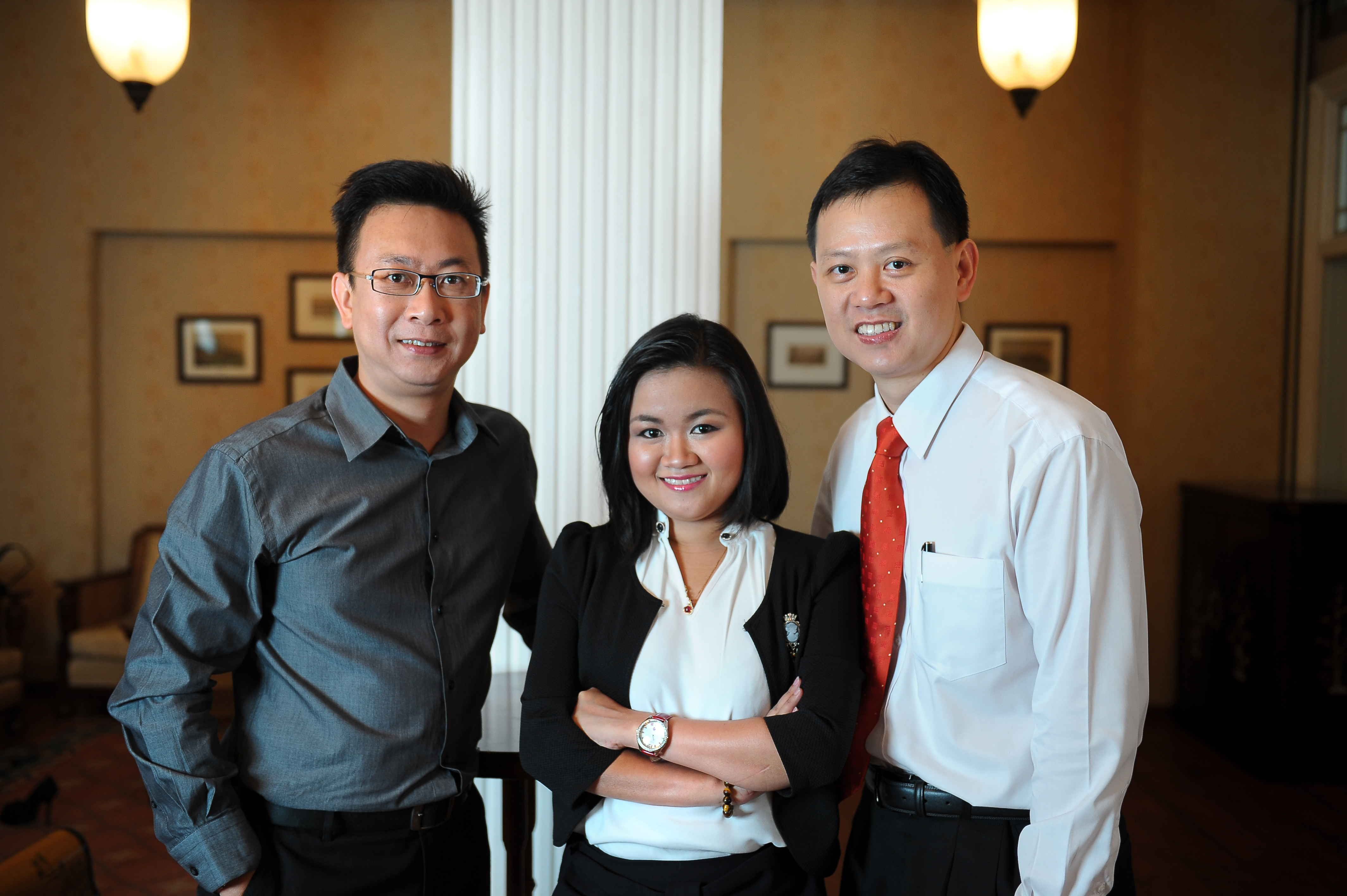Inside the Mind of a Digital Transformation Leader: Dr Jigna Srivastava (GMBA 2007; DBA 2020)
Dr Jigna Srivastava (GMBA 2007; DBA 2020), the Founder of DT Simplified, has had a remarkable career that has seen her don multiple hats with great success. Born and raised in Mumbai and having extensively travelled around the globe, Jigna hails from a humble Gujarati family full of love and warmth. An engineer by qualification, Jigna is a leading Digital Transformation Strategy Advisor today, creating significant disruptions in the digital space.
In this interview, we delve into her journey, insights, and lessons learnt along the way.

Could you tell us a bit about yourself? What did your academic, personal, and professional journey look like?
I have had a very gratifying journey so far, and with the almighty’s grace, there are fewer regrets, immense learnings and much gratitude.
I have donned multiple hats during my career – I’ve led large technical teams, been an individual contributor as well as led large teams, got significant downstream/cross-stream revenue for the groups I worked with, and, most importantly, was instrumental in solving various customer business problems.
The path from a software engineer to a digital transformation strategy advisor was not always smooth, but I am glad to emerge stronger despite it. My family has been my pillar of strength, and I strongly believe in its power to shape our decisions and lives. My parents braved many firsts to fight the conservative traditions to ensure I got the best education and opportunities to utilise my potential. I was a sincere student and did well in my academic years. I also had this creative streak and did great in extracurricular activities like drama, speech, and elocution. I occasionally wrote essays, short stories, and poems during school.
I joined an engineering college after 12th grade in 1995, which was uncommon back then for women. After completing my engineering, I got selected as a trainee software engineer in the R&D department of Asian Electronics in 1999. I used to get a modest monthly salary which would get used up in travel and food. My work was related to embedded systems programming of the energy meter. I simply loved my job and feel thankful for all I learned there. I was a little uncomfortable as I wanted to be independent and not trouble my parents for my expenses. I started appearing for entrance exams of all the well-known IT Services Companies then. I soon received a call from L&T Infotech for an interview for a job with their communications department.
I joined L&T Infotech in July 2000. My first in-house project at L&T Infotech was to assist in designing and developing a VOIP Application using the H 232 protocol. It was such a eureka moment when we heard the first successful voice packet reach from one PC to another over the internet. I was an instrumentation engineer by qualification, but working with computers, telecom, IT, and electronics. I also got to work in Europe and the UK during my tenure at L&T, which was again quite rare back then. Staying abroad, away from the comfort of home, makes a person independent and strong in ways they did not know.

In 2005, my husband, who was then working for Vodafone, transferred to Bangalore, and I shifted from L&T Infotech to Sasken Communications in Bangalore. Somehow, I felt that I was stagnating and needed to complement my knowledge on the business side of aspects. I joined SP Jain’s Global MBA in 2006 and specialised in IT Management. It was a dual-city program back then. I wanted to do my master’s at the best institution and was not disappointed. Later, I joined Kanbay Financial Services, Capgemini (Pune), briefly before moving to TCS in Mumbai. My husband had also moved back to Mumbai by that time. Being part of a Global Consulting Practice and specialising in Enterprise Architecture/IT Strategy consulting in TCS introduced me to the world of consulting. My five years at TCS were full of learning and growing. I did diverse roles, including practice management support, practice operations support, solutioning for presales, engagement management, and EA/IT Strategy consulting across different industries.
The work-from-home option was an alien concept back then for Indian IT services companies. So, after my son’s birth, I took a year off in 2012 to care for him. After a year, I decided to get back gradually. Full-time office hours would not suit me immediately, so I started taking part-time consulting assignments with SS Telecom in 2013.
SS Telecom was a proprietary start-up by a friend and a veteran in the telecom industry with good connections at an executive level. Slowly and gradually, I started doing strategy consulting engagements full-time through SS Telecom in 2015.

2016-2017 was also a time when a lot was set to change due to transformations that were looming over the industries. I decided to upgrade my skills too. After evaluating a couple of options, from courses in digital technologies to doing a PhD, I finally enrolled for a doctorate (DBA) in 2017. There were no second thoughts regarding university, and SP Jain again was my natural choice. Along with the DBA course, I started teaching IT Management, Business Analytics, Data Science etc., in universities like NMIMS, ITM and IBS as a visiting faculty. I also reduced my intake of consulting engagements to do justice to the new course I had taken up. With sheer dedication, my family’s support and excellent guidance from the college, I completed my doctorate in a record 3-year duration in 2020.
Post my doctorate, I considered starting my own advisory/consulting start-up, offering services in digital transformation. However, before I could firm up the plan and work on it, I got an opportunity to do consulting assignment for Lightstorm Telecom through a known industry leader and the founder of TTH Consulting. I took up this assignment, and soon after that initial assignment, I was offered the position of the Head of Enterprise Architecture with Lightstorm in 2021.
During my 1-year stint with Lightstorm, I was involved with digital strategy, program management, digital enterprise architecture, technical scope management with partners and many more areas. It was a great experience to be part of the strategy to implementation initiative and launch a fully cloud-native telco, NaaS POC stack for their B2B fibre business, based on zero-touch management principles.
Towards the end of 2021, I got to work with one of the Big 4 consulting organisations, Deloitte, in their Technology strategy and architecture group as Director for Digital transformation. The prospect of being in one of the Big 4 after working with two start-ups weighed higher compared to other interesting offers I had then. At Deloitte, I took care of digital transformation and strategy consulting with the leading telco in APAC and EMEA, leading the India teams. This involved doing a cloud transformation consulting engagement including revising their 5year IT & Network Strategy for a leading telco in South Africa, Digital Strategy for a leading telco in India, and Cloud native Digital Twin design for Industry 4.0 for a leading manufacturer from the UK for their new plant in Singapore. At the same time, I was doing numerous thought leadership sessions, POV sessions, RFP responses and Orals on different topics related to cloud migration & adoption, network/IT/B/OSS strategy, digital technologies, digital transformation, etc. with executives from the telcos in the EMEA region.
I am at an interesting phase again. The decision to leave a Big 4 at a time when the industry is rationalising was as difficult as it was to deny the joining offer in 2021. I am contemplating whether to join a Big 4 again or any other firm or work towards guiding organisations on their transformation story. In the meantime, I wish to work for my brand DT Simplified, something I have wanted to do for quite some time now. I am planning to take up digital transformation advisory/consulting, writing regularly on various related topics and participating in conferences/events for the time being.
You recently devised an innovative DT Simplified™ framework for guiding the digital transformation of organisations. Could you tell us a bit about this framework? How did you get inspired to design it?
The topic of digital transformation picked up around 2016-2017. Organisations were struggling to achieve successful outcomes due to numerous challenges. Previous research showed that only a handful had started, and very few organisations had matured on their journey. As part of my DBA research, I devised a framework consisting of 7 factors critical for the digital transformation of organisations, which will result in successful business outcomes.
This framework was based on 1200+ digital transformation research papers, 3 strategic theories, and 19 cross-industry digital maturity models. It was tested using a sample of digital transformation experts from the Indian telecom industry and was found to be robust. Research also showed that in addition to knowing the important factors, it was also challenging for organisations in practice to coordinate various digital transformation initiatives and prioritise and execute them successfully. Hence, to bridge this gap between theory and practice, I worked on extending my DBA research framework, and thus, DT Simplified was born.
With 10 critical factors and more than 100 action points, this framework is designed to address digital transformation in a holistic manner. The framework not only depicts the actions but also provides a mechanism to benchmark the digital maturity, prioritise different actions, identify the interdependencies, and translate to a roadmap to measure the effectiveness of the transformation initiatives with its unique COAR™ and SPIO™ methodology.
Since the onset of the pandemic, the world around us has been digitising at a rate never seen before. What are some of the biggest effects of this adaptation?
It is no secret that the pandemic forced us to rethink communication and working methods. It accelerated digital adoption considerably. Communication and collaboration applications like MS Teams, Google Meet, and Zoom calls became the new daily norm, not just for official virtual meets, but also for students’ school classes and family meetings.
Had this option not been available, the already tough time would have become intolerable. Digital avatars and digital games became quite famous amongst Gen Z. Many people also extensively used digital applications to learn new things like cooking from YouTube videos/online recipes, games like chess, etc. Not to forget the utility of the grocery ordering applications that became the most preferred option to shop.
As the famous quote by Frederick Douglass goes, “A man may carve out his circumstances, but his circumstances will carve him out as well”. Even the digital antagonists, who, under normal circumstances, would not have adopted this digital change easily, were left with no choice but to adapt and adopt.
It is often assumed that senior industry leaders cannot find time for their personal lives. How have you led a successful professional life while also nurturing your hobbies and interests?
Juggling multiple responsibilities in a professional career and personal life indeed poses many challenges, and at times, finding the right balance becomes difficult, let alone getting enough quality time to spend for one own self.
As women, we usually ignore personal well-being while prioritising everything and everyone around us. I was no different, but I have built some regular habits that helped me navigate over the last few years.
Every day, I try to prioritise my work and time as per the work that needs to be done during that time. My weekdays are work-bound, and for the last many years now, I usually get stuck in back-to-back meetings that run through the day. It usually leaves little time to do anything that requires thinking and delivering during most of the day’s working hours. For that reason, I start my day very early. Once my son leaves for his school, I do a small yoga workout or indoor walk. Post that, I finish work that requires careful reading/writing before the chaos of the day starts. This may involve writing an article, reviewing a technical document, preparing a proposal solution, and so on. I also reserve 2 hours in my diary towards the end of the day to finish any urgent actions and make a list for the next day. On weekdays, we ensure that we all dine together to catch up on each other’s day, and on weekends, I try to spend more time for myself and my family.

Saturdays are more about catching up on my kids’ studies/projects, any new certification or articles that I wish to do, any other office spills that need to be completed and also requires a no-meeting day and so on. I finish my personal work or any shopping related to home on Sunday’s first half, and the second half is mostly reserved for my family time, where we do not talk about any work. We try to spend it together either on a long lunch or a family movie time or simply relax at home together. For many years we have ensured that we do not plan to attend any social events, parties or late-night outings on a Sunday night. We have Sunday lunch/dinner together to discuss our past week and plans for the next week. It has helped us remain focused and prepared for the next week.
For this very reason, we also do not struggle to get back refreshed to work on Mondays. We also take a mandated family vacation of 3-4 days, at least twice a year, to spend quality family time and bond together.

I also try to learn something new, either on the professional front or for personal development, every quarter. The zest and excitement created by learning new skills and their impact on keeping you mentally fit are very underutilised. For instance, I never played chess as a kid, but I learnt chess in order to motivate my son while he was learning chess. Now I play chess with my son weekly and at least 1-2 games online in between the meetings to keep my brain alive and stimulated. It helps me get back my focus in great ways. I also learnt how to swim and play lawn tennis which I never did as a kid earlier. Co-learning new skills with your kids is also a great way to bond and influence your children’s learning.
Though I do not get much time now, I have done multiple creative experiments in the past. I used to take weekend drama and elocution classes for the kids in my society for a year, work on a blog on food recipes, write scripts for addressing the social issues for cultural events, and was associated with a few NGOs working on social causes. I have also considered scaling a few of these initiatives, but somehow it takes a back seat.
Due to erratic work hours and other chores at home, I had almost developed an eating disorder. Irregular eating and sleeping habits started affecting my health and energy levels. Recently, I have started to work on this by being mindful of what and how I eat.
I have got self-care at the top of my priorities list in the past few months, and I am not disappointed.
What advice would you give young women who wish to reach where you are? In a world where most organisations have a dearth of women in their senior management roles, what can make a difference?
Reflecting on my journey, some of the virtues I picked up from my parents have always helped me make the right decisions at critical times. If my father taught perseverance, hard work, honesty and sincerity, my mother instilled the values of being forward-thinking, ambitious, independent, and strong.
It is also vital that one is not limited by their circumstances from achieving their goals. When I completed my 10+2, I heard concerned well-wishers say that a bank or a teacher’s job in school/college is the safest choice for women, and engineering is probably not a good choice. They were not completely wrong, as very few women chose STEM or engineering then. Eventually, the goal for every girl was set by society: to get married after college to lead a life that her in-laws and husband decided for her.

My advice for young women would be – do not hesitate to fight your way towards your goals or sail against the tide, but be sure to choose your battles wisely. There will be numerous moments when sheerly, by virtue of being a woman, you will face hurdles or roadblocks. These are the moments when you will need to believe in yourself the most. Creating an ecosystem of well-wishers and supporters goes a long way to help one sail through.
Even though corporates and organisations have started taking notice of issues hindering women’s progress, a lot needs to be done. We hear terms like inclusivity, equality, equity and diversity like never before. There is also a growing awareness and empathy with women-centric policies being incorporated. However, the policies are still not reflective of the actual issues women face and do not facilitate the solution for all kinds of problems. The mindset and culture, conducive to enabling women to perform their best at any level, are still rare.
Related Posts
-
 In This World of Internationalisation, Will You Survive?
No Comments | Jul 27, 2011
In This World of Internationalisation, Will You Survive?
No Comments | Jul 27, 2011 -
 When faced with critical decisions, are you equipped to think critically?
No Comments | Oct 14, 2011
When faced with critical decisions, are you equipped to think critically?
No Comments | Oct 14, 2011 -
 You might be a successful leader. But are you memorable?
No Comments | Sep 26, 2014
You might be a successful leader. But are you memorable?
No Comments | Sep 26, 2014 -
 Industry-ready business leaders – Are they born or created?
No Comments | Nov 3, 2014
Industry-ready business leaders – Are they born or created?
No Comments | Nov 3, 2014
